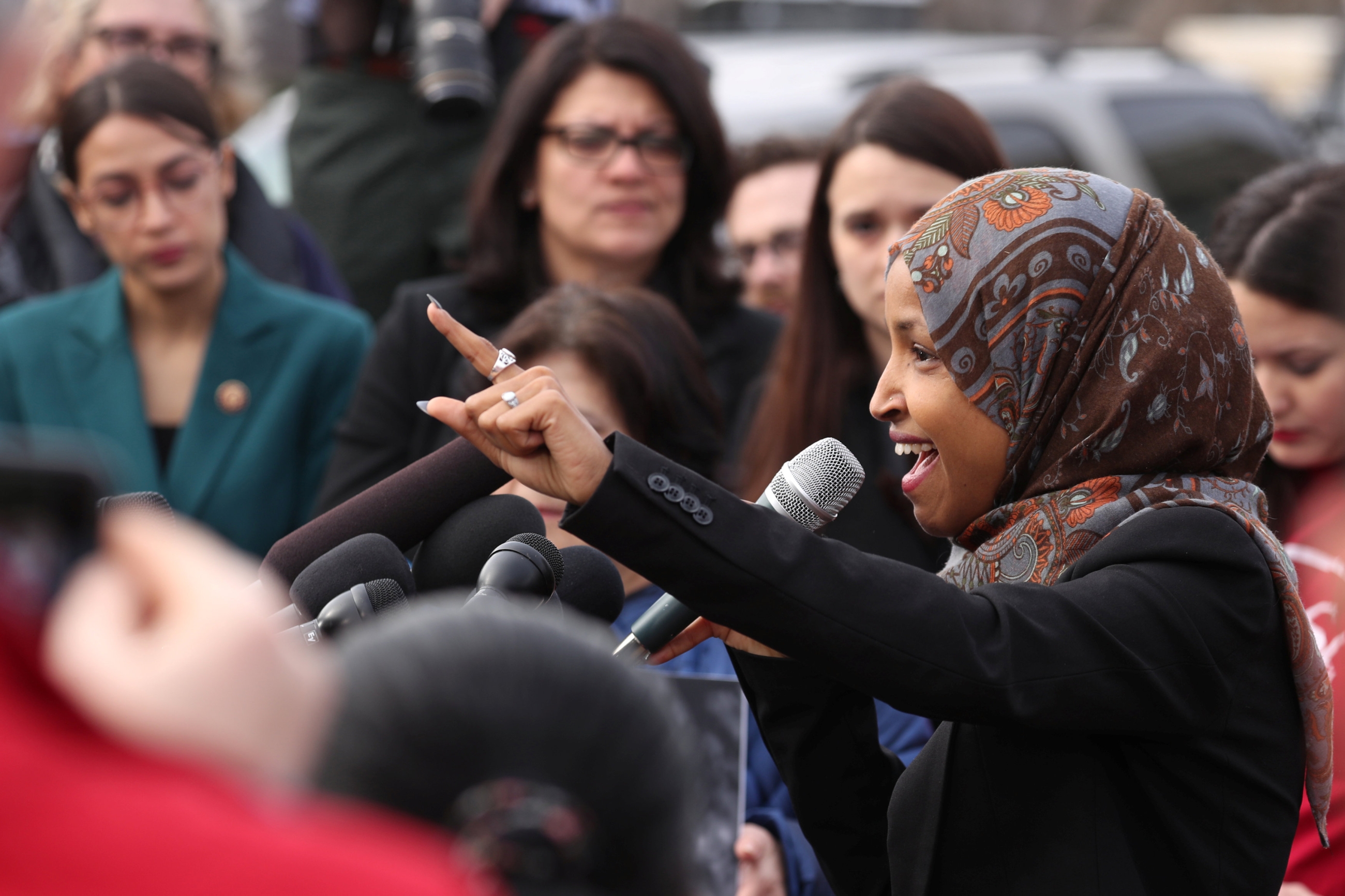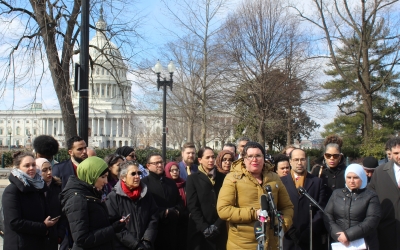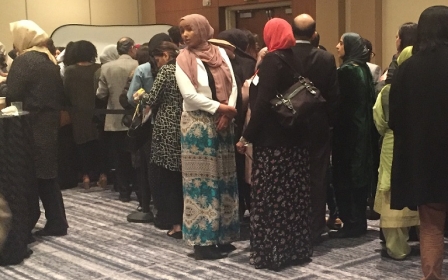Democratic presidential candidates back Ilhan Omar in 'anti-Semitism' row

Top US Democratic presidential candidates have come to the defence of embattled Congresswoman Ilhan Omar amid accusations of anti-Semitism and calls to reprimand the Muslim-American lawmaker for her criticism of Israel.
Bernie Sanders, Kamala Harris and Elizabeth Warren issued statements late on Wednesday denouncing Islamophobic attacks against Omar and highlighting the distinction between anti-Semitism and criticising Israel.
The senators' backing of Omar, at a time when party leaders in the House of Representatives were preparing a resolution to condemn anti-Semitism after the congresswoman's latest remarks, signals a schism within the Democratic Party's approach to US-Israel relations, observers say.
Robert McCaw, director of government affairs at the Council of American Islamic Relations (CAIR), said the Democratic Party is undergoing a generational shift, with an emerging progressive base "that is willing to listen to legitimate criticism of human rights abuses in Israel and want to factor that into how we can achieve peace in the region".
"Presidential candidates are listening and responding to the concerns of the growing progressive base within the Democratic Party that wants to have an open debate and dialogue about Israel," McCaw told MEE.
New MEE newsletter: Jerusalem Dispatch
Sign up to get the latest insights and analysis on Israel-Palestine, alongside Turkey Unpacked and other MEE newsletters
Sanders, Harris, Warren speak out
In his statement, Sanders, who has been critical of Israel in the past, warned against equating "anti-Semitism with legitimate criticism of the right-wing" government of Israeli Prime Minister Benjamin Netanyahu.
"Rather, we must develop an even-handed Middle East policy which brings Israelis and Palestinians together for a lasting peace," Sanders said.
"What I fear is going on in the House now is an effort to target Congresswoman Omar as a way of stifling that debate. That's wrong."
'Presidential candidates are listening and responding to the concerns of the growing progressive base within the Democratic Party that wants to have an open debate and dialogue about Israel.'
-Robert McCaw, CAIR
For her part, Harris, who has emerged as an establishment favourite for the Democratic nomination in 2020, expressed fear that the disproportionate focus on Omar may put the congresswoman "at risk".
That's a concern she said she shares with fellow lawmakers in the Congressional Black Caucus, a contingent of African-American lawmakers.
Speaking at a town hall meeting in Washington last week, Omar detailed the threats and hatred that she has faced, denying accusations of anti-Semitism because of her criticisms of Israel and the American Israel Public Affairs Committee (AIPAC), a major pro-Israel lobby group.
But Omar ignited a wave of outrage when she said at the same event that she wants to discuss the political influence that pushes for "allegiance to a foreign country", referring to the pro-Israel lobby.
The congresswoman's critics said the remarks insinuate that Jewish-Americans are more loyal to Israel than the US, but Omar has said that she only meant to criticise the influence of a special interest group on US foreign policy.
In her statement, Harris dismissed the charges of dual loyalty against Israel's supporters. "We should be having a sound, respectful discussion about policy. You can both support Israel and be loyal to our country," Harris said.
"I also believe there is a difference between criticism of policy or political leaders and anti-Semitism."
In the past, the Democratic senator from California has expressed a strong commitment to Washington's alliance with Israel.
In a speech at an AIPAC conference last year, she said she acquired her support for Israel intuitively, at a young age, like she acquired her love for her family and country.
Warren, a progressive senator who has made addressing economic inequality the central pillar of her 2020 presidential platform, echoed Harris's remarks, condemning both anti-Semitism and Islamophobia.
"In a democracy, we can and should have an open, respectful debate about the Middle East that focuses on policy," Warren said in her statement.
"Branding criticism of Israel as automatically anti-Semitic has a chilling effect on our public discourse and makes it harder to achieve a peaceful solution between Israelis and Palestinians. Threats of violence - like those made against Rep. Omar - are never acceptable."
'Political calculation'
Warren, Harris and Sanders will each be vying for Democratic votes in the race for their party's nomination for president in 2020.
Candidates for president generally adopt views that appeal to their base - Democrats veer to the left and Republicans to the right - in their effort to secure the most votes and eventually land the nomination.
With that in mind, Ahmad Abuznaid, director of the National Network of Arab American Communities, said the candidates' support for Omar now is a "political calculation".
"I think these presidential candidates are weighing the fact that the base of the Democratic Party, the progressive wing of the Democratic Party, are all further to the left on this subject than the senior leadership of the party," he told MEE.
In fact, despite the senators' statements, Nancy Pelosi, the Speaker of the House of Representatives and a top Democrat, is poised to push forward a resolution that was originally drafted in response to Omar, US media outlets reported on Thursday.
While the resolution was initially set to condemn anti-Semitism, language condemning all forms of bigotry, including Islamophobia, was reportedly added to the proposal.
The resolution was also first expected to come up for a vote on Wednesday, but it was delayed amid widespread criticism from progressive and black lawmakers over how the Democratic leadership has responded to the row.
"I don't believe it was intended in an anti-Semitic way. But the fact is if that's how it was interpreted, we have to remove all doubt," Pelosi said of Omar's comments on AIPAC on Thursday, the Hill reported.
Still, McCaw, of CAIR, said it is "disingenuous" to pretend that the resolution is not about Omar, given that it was initially introduced to "punish and silence her for her comments about a foreign nation".
"CAIR absolutely believes Congress should condemn anti-Semitism, Islamophobia, anti-black racism, anti-immigrant sentiment and xenophobia," McCaw said.
Still, he added: "It's problematic when it was done to punish and silence a freshman congresswoman because she spoke out about the human rights abuses that are taking place in Israel."
Abuznaid acknowledged the sensitivities of Jewish-Americans to "anti-Semitic tropes that have gone on to cause real harm to the Jewish community".
But he said he does not believe what Omar said is anti-Semitic, or that the resolution denouncing bigotry is necessary.
"I don't think it was needed," Abuznaid said. "The resolution was to be done in direct response to Ilhan Omar's comment, which I think makes it that much more irresponsible."
Middle East Eye delivers independent and unrivalled coverage and analysis of the Middle East, North Africa and beyond. To learn more about republishing this content and the associated fees, please fill out this form. More about MEE can be found here.






